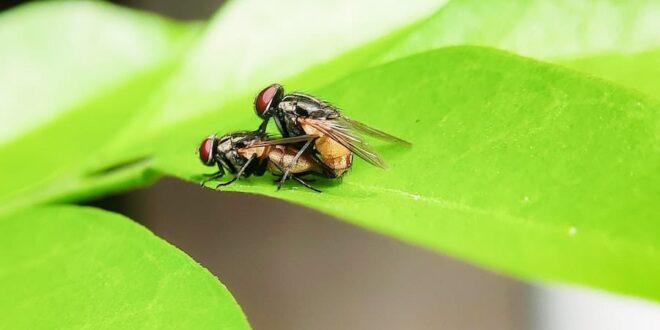Why do flies land on humans? These little insects that are always buzzing around can be quite a nuisance. They are often associated with transmitting germs and diseases, making them even more unwelcome.
Despite our best efforts to keep our surroundings clean and tidy, flies still manage to find their way to us, landing on our bodies seemingly without any apparent reason.
But why do they like landing on us? Is there something about us that they find irresistible? This article will discuss this matter in detail and uncover the secrets behind their behavior.
Why Do Flies Land On Humans?
Those tiny, pesky creatures always seem to find their way into our personal space and have a knack for landing on us at the most inconvenient times.
But have you ever wondered why they do it? It turns out; there are several reasons behind this bothersome behavior. Let’s look at some of them.
- The fruity scent of your soap or shampoo – Flies are incredibly sensitive to smells. That enticingly fruity aroma of your soap or shampoo might be like a neon sign to them, inviting them to explore. The pleasant scents can be a strong lure for these curious insects.
- You are the tallest person in the group – This rightly seems unfair. Flies are always looking for surfaces to land on, and if you’re towering above the rest, you become an appealing perch.
- To feed on dead cells and open wounds might sound unsettling, but flies are natural scavengers. They’re attracted to decaying organic matter, including dead skin cells and even open wounds, as they provide a ready source of nutrients.
- They are attracted to the carbon dioxide we breathe out – Just like mosquitos, flies are attuned to carbon dioxide.
When we exhale, we release this gas, signaling to flies that a potential food source might be nearby. It’s like a dinner bell ringing for them, and they hardly miss it.
- The heat from our bodies attracts them – Flies are highly sensitive to temperature changes and might seek the warmth we radiate. They seek this warmth as it indicates a suitable environment for their activities.
- The oil from our hair is an important part of their food – Flies are not just after our skin; they have an appetite for the natural oils our hair produces. These oils contain essential nutrients that flies find nourishing. So, when they land on you, they might have a tiny feast.
- Sweat and salt from our bodies – Our sweat contains salt, a valuable mineral for flies. Have you ever noticed you tend to see flies after sweating in the sun or after engaging in physical activities? You now know why.
What Attracts Flies In Your House?
Flies are attracted to several factors often found in and around our homes.
Dirty conditions – If you leave food scraps, crumbs, or spills unattended, they become magnets for flies. Regular cleaning and proper waste disposal can help reduce this attraction.
Sticky surfaces from drink spillages – Flies also like sugary substances like spilled drinks or residues left on countertops. Their keen sense of smell allows them to detect even the faintest whiff of sweetness. Wiping down surfaces after spills can help deter their interest.
Spilled food – That tiny crumb you accidentally dropped might seem insignificant to you, but to flies, it’s a feast. Even the tiniest bits of food can lure them into your living spaces.
Scum at the bottom of drains – The damp and decaying matter accumulating in drains is a paradise for flies. They thrive on decomposing materials and moisture; they regularly clean and maintain drains to keep them away.
Alcohol – This might surprise you, but flies are drawn to the aroma of alcoholic beverages. They can be especially attracted to beer and wine. So, if you’re enjoying a drink outdoors, consider using covers or lids to prevent flies from diving.
How To Keep Flies Away From Your Home
Are you tired of sharing your living space with flies? Luckily, you don’t have to endure their constant buzzing and annoyance. Here are a few simple strategies to effectively keep flies away from your home.
- Mind your food – Flies have an uncanny ability to detect food from a distance. To discourage their presence, ensure that you never leave your food uncovered.
- Don’t leave dirty dishes in the sink – Flies are drawn to dirty dishes like moths to a flame. Avoid letting dirty dishes pile up in the sink, as the residual food particles attract these unwanted visitors.
- Remove over-ripened fruit – Overripe fruit can quickly become a breeding ground for fruit flies. Regularly inspect your fruit bowl and discard any fruit past its prime.
- Regularly clean your trash bins – Flies are notorious for congregating around trash bins. Empty and clean your trash bins regularly to prevent odors that attract flies.
- Pet cleanup – If you have pets, promptly clean up their feces from your yard. Fly larvae thrive in fecal matter, and maintaining a clean outdoor space reduces the chances of flies infiltrating your home.
- Install fly screens – Installing fly screens on doors and windows provides a physical barrier that prevents flies from entering your home while allowing fresh air to circulate.
- Wipe away spills – Flies are also attracted to spilled food and water. Regularly clean up spills and crumbs to eliminate potential feeding sites for flies.
- Take advantage of plants – Consider growing lavender and basil near entry points to your home. These aromatic plants add beauty to your surroundings and serve as natural fly repellents.
- Eucalyptus oil trick – Hang a cloth soaked in eucalyptus oil near doors or windows. Flies are deterred by the strong aroma of eucalyptus, making this a simple and effective way to keep them at bay.
What Do House Flies Look Like?
House flies, scientifically known as Musca domestica, are common pests in homes and other environments.
They have six legs, which they use for walking and perching on various surfaces. Their bodies are small and oval-shaped, measuring about 4 to 7.5mm long. ‘
These flies also have antennas on their heads, which help them detect food sources and navigate their surroundings.
In terms of appearance, house flies are typically grey. However, their most distinguishing feature is the presence of four black stripes on their chest.
These stripes, known as thoracic stripes, are a key identifying characteristic of the species. Female house flies are usually larger than males, although the difference may not be significant.
Are House Flies Dangerous?
House flies may seem harmless, but they can be quite dangerous. Not only can they cause annoyance and discomfort, but they also serve as carriers for various germs and diseases.
These insects have the ability to pick up pathogens from their surroundings. As they move from one location to another, they transfer these harmful microorganisms onto surfaces they encounter.
House flies transmit tuberculosis, food poisoning, cholera, eye infections, E. coli, typhoid fever, and dysentery. Food poisoning occurs when we consume food contaminated with bacteria or toxins.
Cholera is a severe gastrointestinal infection caused by the bacterium Vibrio cholerae. Eye infections can result from transmitting bacteria such as Staphylococcus aureus or Streptococcus pneumoniae.
E. coli is a type of bacteria that can cause severe diarrhea and other gastrointestinal symptoms. Typhoid fever is a potentially life-threatening disease caused by the bacterium Salmonella typhi.
While house flies can carry these germs and diseases, they do not cause the diseases themselves. However, their role in spreading these pathogens makes them a significant health concern.
Conclusion
Why do flies land on humans? The behavior of flies landing on humans is because of several factors.
Flies are attracted to the warmth and moisture that our bodies emit, making us an ideal landing spot for them.
Additionally, they are drawn to our odors and scents, such as sweat and body odor. Flies also have a natural tendency to seek out sources of food found on our skin or clothing.
While it may be annoying to have flies constantly landing on us, it is simply a result of their instincts and the environment we provide for them.
 Being Human
Being Human




